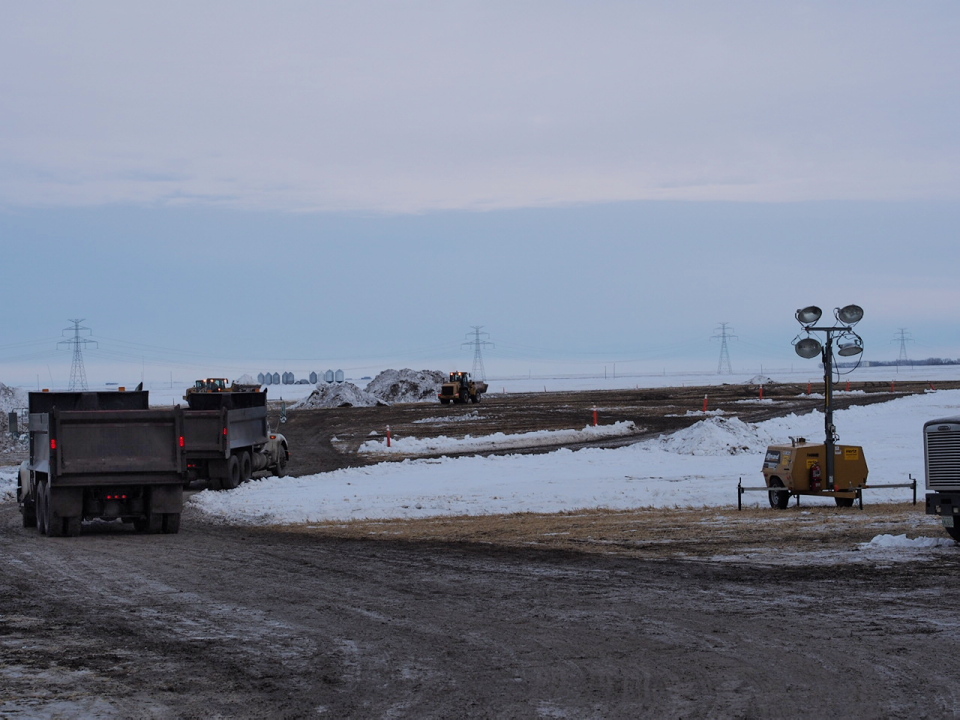Tar-sand’s Dilbit Makes Regina Debut but Neil Young Tough Act to Follow
Tar-sand’s Dilbit Makes Regina Debut but Neil Young Tough Act to Follow

On Saturday January 18, 2014, in the morning after Friday’s Neil Young Honour the Treaties concert in Regina, a pumping station leak south of the city resulted in an estimated 20,000 litres of ‘heavy oil’ leaking. An unknown quantity sprayed onto an adjoining property. The weather was mild with a northwestern wind, blowing away from the city. The pipeline and pumping station are owned by Enbridge. According to a company press release, a leak was detected just before 11 AM. Line 67 was shut down and operating again by 10 PM. The Rowatt Station is expecting or has been upgraded with a new mainline pump to meet Enbridge’s expansion requirements. The cause of the leak is undetermined and under investigation by the company. National Energy Board (NEB) officials are on-site monitoring and assessing the response. Clean up was expected to be complete by Monday.
Enbridge’s Line 67, also known as the Alberta Clipper, ships a product alternatively known as dilbit or diluted bitumen. Bitumen is the substance extracted at the Alberta tar-sands mines. Line 67 operates at a capacity of 450,000 barrels-per-day, and received permission for expansion to 570,000 barrels in February 2013. Enbridge expects completion of the upgrades by fall. Enbridge has a Phase II Plan, to increase volume to 800,000 barrels-per-day, seeking regulatory authorization.
Enbridge’s Line 67 carries dilbit from Hardisty, Alberta to Superior, Wisconsin. Along this route, in Marshall, MI, Enbridge had a spill in 2010, which it failed to clean-up. That spill is the largest spill on land in United States history, and left thirty-five miles of destruction down the Talmadge Creek, Battle Creek River, and Kalamazoo River. As of last September, more than 650,000 litres of the spill remained on the bottom of the Kalamazoo River. The Environmental Protection Agency ordered Enbridge to dredge the river clean by the end of 2013. Enbridge expects to be done this spring. Residents near this spill, and those near the recent Exxon spill in Mayflower, Arkansas, have dealt with health concerns since. Economic turmoil accompanies ill health, as real estate and small business plummet.
Besides carrying bitumen extracted from Athabasca Chipewyan First Nation (ACFN) traditional territory, Line 67 crosses other First Nation traditional territories. Hardisty, Alberta, the starting point for the Alberta Clipper, is a huge tank farm in Treaty Six territory. Regina is in Treaty Four region, and the pipeline goes eastward through Treaty 2 and 1. All these lands have continued significance to Oyate, Nehiyaw, Anishinaabe, and Metis. Anishinaabe near Lake Superior, members of White Earth Reservation and Red Lake Tribe, are actively resisting and opposing Enbridge’s activities. Red Lake never permitted pipeline activity. On their traditional land is a wild rice, manoomin, endangered by industrialization. They also stand in solidarity with the ACFN legal challenge. Neil Young’s Honour the Treaties tour is raising funds for the ACFN legal defense fund.
Enbridge, other companies, and industry organizations do not distinguish diluted bitumen from heavy oil. Although the hard asphalt-like bitumen needs to be blended with another substance to give it the properties and characteristics of heavy oil, industry data considers it insignificant to differentiate. People in Mayflower, AK and Marshall, MI who reported ill effects during the spill, and those with continuing long term effects would consider it significant. The fact that Rowatt Station is within a few kilometers of homes and schools is worth considering. And prairie wind in Regina often comes from the south east.

